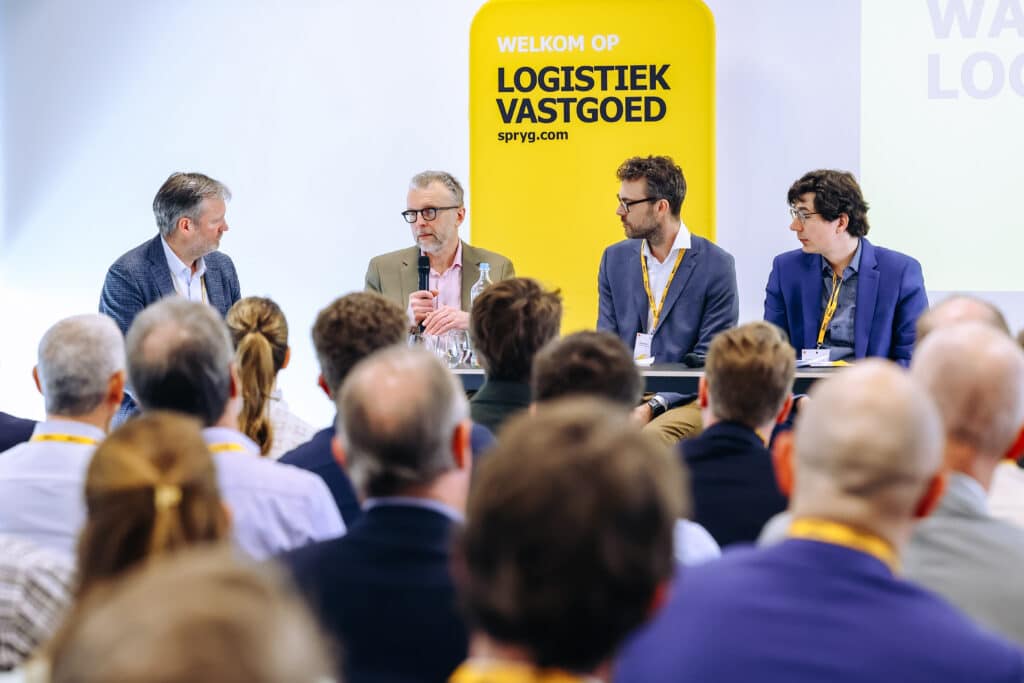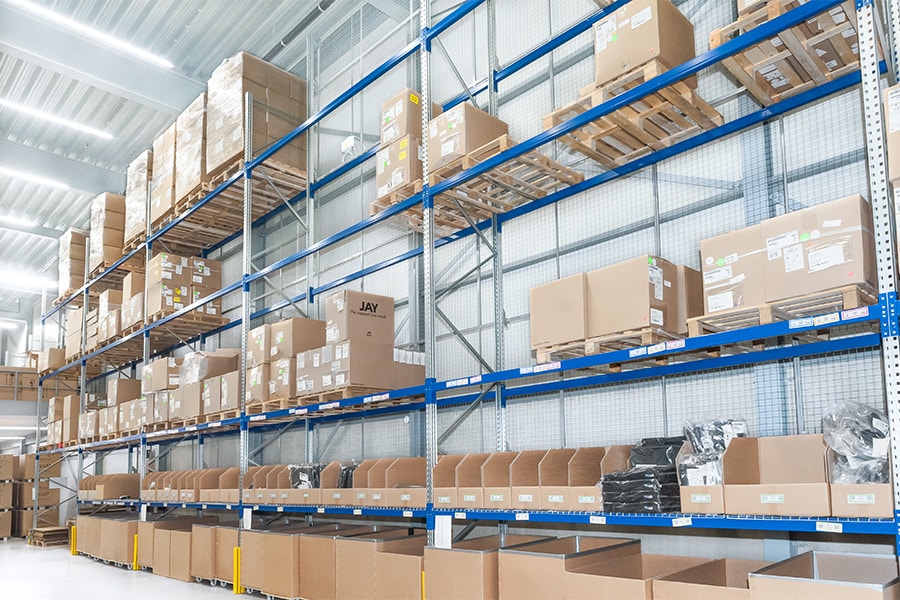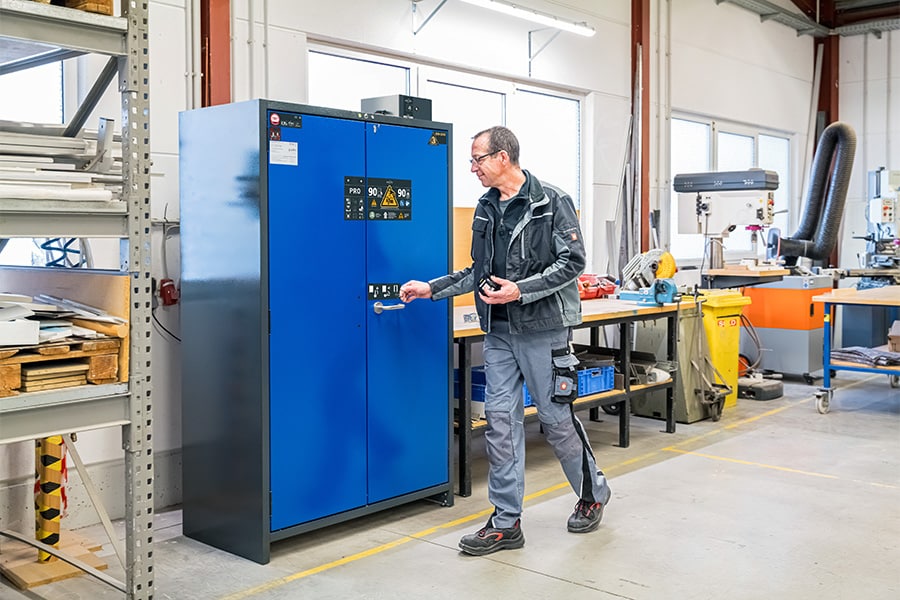
Logistics & Real Estate Belgium 2025: inspiration, networking and future visions
On March 25, 2025, the 14th edition of "Logistics & Real Estate Belgium," organized by SPRYG Real Estate Academy, took place in Lokeren. More than eighty logistics real estate professionals gathered at La Vue, KDL's event venue, for inspiring keynotes, debates and networking opportunities. This annual event brings together real estate developers, investors, policy makers and logistics service providers to discuss key trends and challenges in logistics real estate.
Today's logistics real estate market
After a brief welcome by Kris De Leeneer, CEO of KDL, opened day chairman Bart Vanderhoydonck, partner and head of Industrial & Logistics Agency at Cushman & Wakefield, opened the meeting with an introduction on the current state of the logistics real estate market. He then presented Johan Beukema, managing partner at Buck Consultants International provided an in-depth overview of global trends and their impact on the Belgian logistics sector. He discussed how globalization, digitalization and geopolitical tensions (such as trade sanctions and war conflicts) are forcing companies to make their supply chains more flexible and resilient.
Johan Beukema also addressed the current economic uncertainty, rising construction costs and the impact of inflation on real estate investments. The increasing demand for e-commerce and fast deliveries means that logistics companies must work more efficiently and be more creative with the scarce available space. The shift to more automated warehouses and AI-driven logistics solutions is also booming business.
Another major theme in the logistics real estate industry is sustainability. The top executive at Buck Consultants International emphasized the importance of environmentally friendly transportation equipment and carbon reduction, and how technologies such as AI and data analytics contribute to more efficient logistics. His advice: invest in strategic partnerships, diversify suppliers and optimize warehouse and transportation processes. Circularity in construction was also cited as an important trend: new logistics centers should consider reuse of materials and energy-efficient designs.

Geopolitics and the future of logistics
Alex Van Breedam, CEO of TRI-VIZOR and professor at the Antwerp Management School, among others, discussed the impact of geopolitical developments on supply chains. He pointed to the disruptions caused by Covid-19, the energy crisis and raw material scarcity, causing companies to increasingly opt for "reshoring" and "nearshoring." Protectionism and trade restrictions are also playing an increasing role, forcing companies to seek alternative suppliers and redesign their supply chains.
His recommendations? Leverage AI and technology, strengthen risk management and invest in sustainable logistics. Flexibility and agility are the keywords in this new reality. In addition, he indicated that companies that deploy digital twins (virtual replicas of logistics processes) will be better able to absorb shocks and optimize their operations.
Debate: where is there still room for logistics real estate in Belgium?
During the first debate, experts addressed the sector's spatial challenges. Mattias Van Vooren, director Department of Economics City of Ghent, Tim Brijs, head of business development at Heylen Warehouses, and Alex Van Breedam discussed, among other things:
- More efficient use of existing warehouses: automation can and will help replace scarce logistics workers and increase productivity.
- Space distress and brownfield development: redeveloping old business sites can be a solution to the lack of good real estate locations. Optimizing existing infrastructure is crucial to support the sector's growth.
- Smarter logistics space utilization: building in height and combining functions (such as shared parking towers and loading docks) can contribute to more efficient use of space. In addition, implementing shared warehouses between companies can increase the utilization of available capacity.
- Problems in brownfield development: pollution, permitting procedures and the choice between renovating or rebuilding remain challenges. However, governments can provide support through subsidies and relaxed permitting procedures.
Liege Airport: master plan 2040
Laurent Jossart, CEO of Liege Airport, presented the ambitious Master Plan 2040. With a current cargo capacity of 1.16 million tons, the airport aims to double this to 2.3 million tons and become a top three cargo airport in Europe. Strategic assets such as its location within Europe's "golden triangle" and 24/7 operations make Liege Airport attractive to logistics investors.
Sustainability plays an important role: by 2030-2050, the airport aims to be carbon neutral, with investments in noise reduction, water management and environmentally friendly transport options. Collaborations with the Port of Antwerp-Bruges and the Port of Liège strengthen multimodal connections. The expansion of airport-related infrastructure and improved road connections will have a major impact on the regional economy.

Port of Antwerp-Bruges: ambitious growth plans
Dries Van Gheluwe, manager invest at Port of Antwerp-Bruges, explained the port's future plans. With an annual cargo volume of 277.7 million tons and billions invested in infrastructure and sustainability - such as a green hydrogen plant and circular economy projects - the port continues to position itself as an innovative logistics hub.
New terminals and high-tech storage facilities strengthen the competitive position, while digitization and automation contribute to efficient and sustainable logistics. The port is also investing in smart logistics solutions and blockchain technology for transparent and efficient data exchange between stakeholders. Strategic projects such as NextGen and the expansion of container capacity (ECA) support the competitive position.
PostNL: the green warehouse of the future
Arvin Willemse, CEO of PostNL Belgium, presented the company's sustainability strategy. PostNL is committed to emission-free deliveries and environmentally friendly distribution centers. The four pillars of their approach:
- Sustainable buildings: solar energy, water recovery and waste reduction.
- Emission-free mileage: electric vehicles and train transportation.
- Efficient network: route optimization and smart logistics.
- Green products and services: reusable packaging and circular initiatives.
PostNL Belgium's top executive also zoomed in on the company's plans for a zero-emission last mile:
- 2024: 130 electric vans and cargo bikes in various cities.
- 2025: emission-free delivery in 30 city centers.
- 2030: completely emission-free last mile in the Benelux.
Final debate: opportunities and challenges in logistics real estate
The event concluded with a debate between Jonas De Lannoy, director of capital deployment & leasing at Prologis, Jurgen Bevelander, director corporate real estate at DHL Benelux, Ivo van Hauten, account manager Spatial Economy Agency Innovation & Entrepreneurship (VLAIO) and Robin Bruninx, CEO Enron. Some key discussion points:
- DHL sustainability strategy: CO₂-neutral by 2025, with a checklist of 20 sustainable requirements for new buildings.
- Challenges in renovation versus new construction: logistics real estate projects require careful planning and coordination between tenants and landlords.
- Brownfield development as booming business: due to limited space, old sites are increasingly being redeveloped.
- Energy transition and logistics: electrification of vehicles and buildings offers opportunities, such as investing in batteries for renewable energy storage.
Summary
'Logistics & Real Estate Belgium 2025' once again offered an inspiring look at the future of the sector. From sustainability and geopolitical challenges to innovation and efficient use of space, the logistics real estate sector faces important transitions. The insights from the keynotes and debates can help companies adapt their strategies and stay future-proof.




